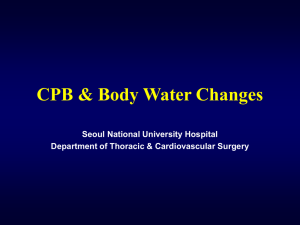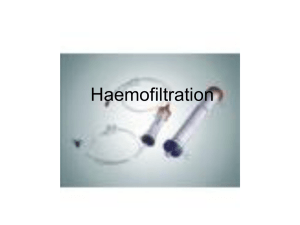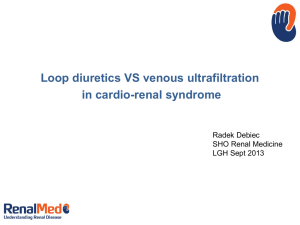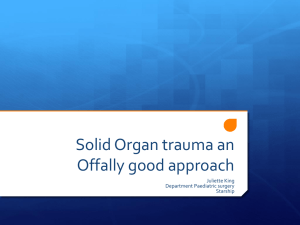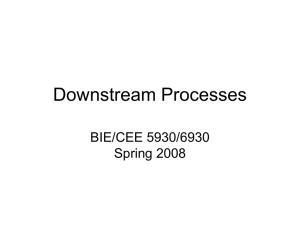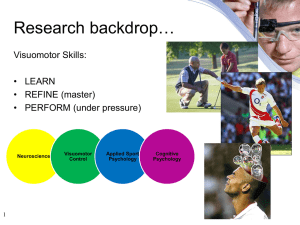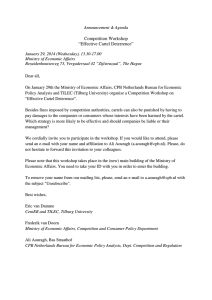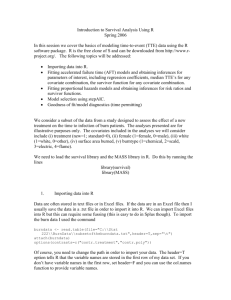Ricci-PCRRT 2010 def - Pediatric Continuous Renal
advertisement
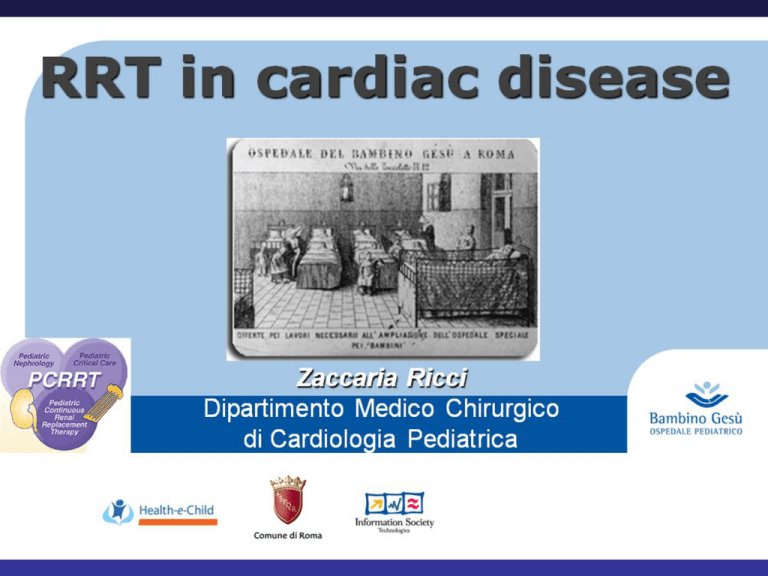
RRT in pediatric Heart Surgery : Specific indications 1) Fluid overload control (unbalance infusion requirements/pt weight) 2)Cytokine Clearance (CPB associated SIRS , post op sepsis) 3) Capillary leak syndrome (extracorporeal surface contact, RAAS/BNP disequilibrium, hypothermia, cyanosis) 4) Cardiorenal-renocardiac syndromes RRT in pediatric Heart Surgery : Specific modalities CPB with UF CPB with CRRT CRRT during ECMO “Traditional” CRRT POTENTIAL ROLE OF ULTRAFILTRATION IN POST CPB CAPILLARY LEAK SYNDROME UF/HF ULTRAFILTRATION During CPB NOMENCLATURE •Conventional Ultrafiltration •Modified Ultrafiltration •High Volume Zero Balanced UF Conventional Ultrafiltration • • • • • After aortic declamp During rewarming UF in parallel with CPB Inlet after the oxygenator Ultrafiltered blood returns into venous reservoire Advantages: It does not delay surgical times It removes UF during highest mediator production phase Disadvantages: It might quickly empty reservoire volume From Chang AC, Hanley FL, Wernovsky G, Wessel DL. Pediatric Cardiac Intensive Care ed W&W 1998 Modified Ultrafiltration Advantages: Significantly higher efficiency Disadvantages: Cumbersome procedure Patient cooling Hemodynamic instability From Chang AC, Hanley FL, Wernovsky G, Wessel DL. Pediatric Cardiac Intensive Care ed W&W 1998 POTENTIAL ROLE OF ULTRAFILTRATION IN POST CPB CAPILLARY LEAK SYNDROME • Inflammation mediators removal - C3a, C5a, IL-6a, IL-8a, TNF, MDF, ET-1 • Total body water reduction – – – – Tissue edema decrease Hematocrit increase Coagulation factors concentration Decreased need of hemoderivates UF ON LEFT VENTRICULAR FUNCTION 1. 2. 3. 4. Myocardial edema decrease DO2 increase Left ventricular compliance increase Systolic and diastolic function improvement Davies MJ. J Thorac Cardiovasc Surg 1998 HIGH-VOLUME, ZERO BALANCED ULTRAFILTRATION (Z-BUF) • Twenty children undergoing cardiac surgery assigned to Z-BUF or a control group. • C3a, IL-1, IL-6, IL-8, IL-10, TNF, myeloperoxidase, and leukocyte count were measured before (T1) and after (T2) hemofiltration and 24 h later (T3). • Isovolumetric UF during rewarming with high UF volumes and equivalent amount of reinfusion solution (average 4.972 ml/m2) • MUF after CPB weaning in both groups in order to remove excess fluids Journois et al, Anesthesiology: Volume 85(5) November 1996 pp 965-976 MEMBRANES (NOT UF) CLEAR MEDIATORS in CHILDREN UNDERGOING CVVH – Decrease of body temperature at T2 and T3 – Decrease of neutrophils count – Decrease of inotropic support – Decrease of blood loss at T2 and T3 – Decrease of postoperative ΔAaO2 (320 vs. 551 mmHg) – Positive correlation between ΔAaO2 and UF/TBV ratio. – Decrease of time to extubation (10.8 vs. 28.2 h) Journois et al, Anesthesiology: Volume 85(5) November 1996 pp 965-976 Removal of prostaglandin E2 and increased intraoperative blood pressure during modified ultrafiltration in pediatric cardiac surgery Kazuto Yokoyama et al JTCVS 2009 Removal of prostaglandin E2 and increased intraoperative blood pressure during modified ultrafiltration in pediatric cardiac surgery Kazuto Yokoyama et al JTCVS 2009 Intraoperative Continuous Venovenous Hemofiltration during Coronary Surgery CVVH post 35 mL/kg/h Qb 150 ml/min No heparin. Bicarbonate buffer Net UF rate 500–1000 mL/h Roscitano et al, Asian Cardiovasc Thorac Ann 2009 Intraoperative Continuous Venovenous Hemofiltration during Coronary Surgery Antonino Roscitano, MD, Umberto Benedetto, MD, Massimo Goracci, Fabio Capuano, MD, Remo Lucani, MD1, Riccardo Sinatra, MD Roscitano et al, Asian Cardiovasc Thorac Ann 2009 Reduction of Early Postoperative Morbidity in Cardiac Surgery Patients Treated With Continuous Veno–Venous Hemofiltration During Cardiopulmonary Bypass VAM in thetreatedgroup: CVVH group 3.55 ± 0.85 h vs control group 5.8 ± 0.94 h, P < 0.001 ICU STAY: CVVH group 29.5 ± 6.7 vs. control group 40.5 ± 6.67 h, P < 0.001. Luciani et al Artif Organs 2009 Anti-inflammatory modalities: Their current use in pediatric cardiac surgery in the United Kingdom and Ireland Allen et PCCM 2009 “…there are still widespread variations in practice. Rather than reflecting poor clinical practice, we believe this reflects a lack of good evidence supporting clinical benefit” Acute kidney injury and renal replacement therapy independently predict mortality in neonatal and pediatric noncardiac patients on extracorporeal membrane oxygenation Neonates Children Askenazi et al PCCM 2010 PCRRT and ECMO • Especially in the smaller children and infants solute clearance on ECMO is greater then standard PCRRT due to the relatively high blood flow rates • Ultrafiltration error may not be easily recognized due to the maintenance of hemodynamic stability that ECMO gives • Excessive ultrafiltration due to ultrafiltration controller error ECMO-CVVH machines “interaction“ Courtesy of Norma J Maxvold (modified) N = 4 pts with AKI (2 neonates +2 children) 1 neonate and 1 child required pCRRT+ECMO 1 neonate a 1 child required pCRRT alone ECMO and NGAL Bambino Gesù experience 2 12.5 7.5 mg/dl ml/kg/h 10.0 5.0 1 2.5 0.0 surv non surv -2.5 Urine output 0 surv non surv creatinine Ricci Z, unpublished, 2010 ECMO and NGAL Bambino Gesù experience * 700 600 500 500 ml ng/ml * 1000 400 300 0 200 100 -500 0 surv non surv NGAL surv non surv Fluid balance Ricci Z, unpublished, 2010 survived non surv 700 600 ng/ml 500 400 300 200 day 7 day 6 day 5 day 4 day 3 day 2 0 day 1 100 NGAL Ricci Z, unpublished, 2010 CASE REPORT 1 CVVH + Berlin Heart: 1) Cardiac index 2) REDVI 3 2,7 2,4 2,1 1,8 1,5 450 400 350 300 250 CASE REPORT 1 Body water distribution BW TBW ECW ICW 100 80 60 40 20 0 1° D 2° D 3° D 4° D 5° D CASE REPORT 2 Patient on ECMO for dilative cardiomyopathy, 35 kg •Anuric •Fenoldopam 0,4 mcg/Kg/min, no diuretics, no vasopressors •Ischemic/thromboembolic event to right inferior limb (previous femoral artery cannulation): Right inferior limb compartment syndrome (no surgery). Serum myoglobin > 50000 ng/ml •CVVHDF 50 ml/kg/h After 3 ECMO days, Htx. Need for CVVHDF for 22 POD days ICU discharge on POD 25 with normal renal function Ricci et al, Blood Purif 2010 CASE REPORT 2 •Need for up to 12 grams/day of iv phosphate replacement •Need for KCl correction in the replacement/dialysate bags (about 500 mEq/day) •Vancomycine continuous infusion (7 days) increased from 50 mg/kg/die to 100 mg/kg/die on serum levels •Immunosuppression with iv continuous cyclosporine increased from 100 to 150 mg/die on serum levels Ricci et al, Blood Purif 2010 All that glitters is not gold Patient n. Age Weight Preoperative diagnosis Presence of ECMO (yes/no) 1 4 days 3.5 HLHS Y 2 2 years 9 Dilated miocardiopathy N 3 35 days 4 AoCo+SubAoSt Y 4 45 days 4.2 TGA with coronary restenosis Y 5 28 days 3.8 PA with IS N 6 25 days 3.1 TGA Y 7 5 days 2.8 HLHS Y 8 10 days 3.5 HLHS Y 9 1 year 6 Dilated miocardiopathy Y 10 2 months 5.2 CAVC N BNP BNP CONCLUSIONS 1. AKI in pediatric cardiac surgery is frequent. 2. UF during CPB is beneficial. 3. Application of CRRT to extracorporeal circulatory devices is possible. 4. High expertise, safe machines and trained staff is mandatory. 5. Dedicated equipment and prospective studies are dramatically lacking
